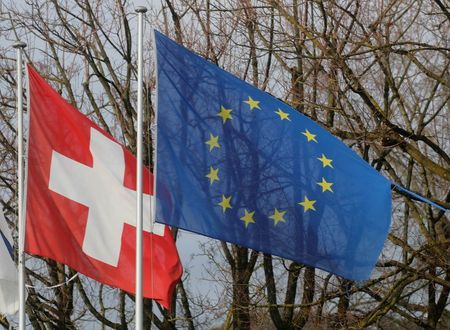Switzerland heads for Brexit-like EU clash with €227bn at stake from today

From today, Swiss medical-technology companies will no longer be allowed to export duty-free to the European Union as Bern and Brussels failed to agree to a long-anticipated political treaty that would cover trade between the two countries.
The goods-trading relationship at risk is worth $278bn, with medical-technology companies being the latest casualty of a deteriorating relationship between Brussels and Switzerland as the latter faces increasing barriers to the single market. The showdown has been compared with Brexit.
“With Brexit, the EU has had to think harder about what it means to be in the single market and what rights and privileges come with that,” Nicolas Veron, a fellow at the Brussels-based think tank Bruegel, told Bloomberg earlier today.
The former chief negotiator with the EU, Jacques de Watteville, said there was a “a hardening of tone in the air” while speaking at a panel discussion hosted by the Jean Monnet Foundation for Europe earlier this month.
Individual deals
For years the two sides managed their trade through a range of loose individual deals but they have, so far, been unable to come to a new umbrella political treaty, as was the initial aim of the ongoing talks.
Switzerland will be downgraded to “third country” status, meaning they will need to have a representative within the bloc, meet the EU’s product-labeling specifications and deal with other red tape.
Switzerland exports more to the EU than to China and the U.S. combined, according to figures from the Swiss Federal Customs Administration.
The showdown could also hurt its electricity market, industrial companies and its lucrative banking sector.
Moreover, the country’s med-tech sector employs over 60,000 people, accounting for around 3 per cent of Switzerland’s GDP.
Despite moves by the government to guarantee continued EU supplies to Switzerland, industry groups like Swiss Medtech estimates product-development costs could rise by 30 per cent from hurdles to trade, according to estimates reported in Swiss media this week.
Norway
The precarious escalation in Switzerland comes only days after City A.M. reported that another pan-European trade link is increasingly in jeopardy.
A comprehensive free trade deal between the UK and Norway is at risk of collapsing as the Christian Democrat party fears such a pact would hit farmers in Scandinavia’s richest country too hard.
The Christian Democrats party (Krf), part of the current coalition government, plans to block opening up the Norwegian market to British beef and cheese, fearing non-tariff access would put many farmers in the country out of businesses, according to a Krf party insider.
After the EU, the UK is Norway’s most important trading partner, with an estimated annual value of around £20bn.
The three governing parties have to reach an agreement before 28 May, as there would otherwise not be enough time left to pass the required pieces of legislation in the Norwegian parliament before national elections are held on 13 September.
It is becoming increasingly unlikely, however, that the Christian Democrats are prepared to agree to a non-tariff deal, given that the party traditionally leans heavily on Norway’s rural vote.
According to the most recent polls, the party is well behind, polling at only 3.4 per cent of the vote.
Read more: The hidden impact of Brexit: Supply chains are failing UK trade and construction firms
Only three weeks ago, a fishing deal between the UK and Norway collapsed, as parties could not agree on annual catches.
The failure to reach an agreement left the British fishing industry trembling with fury and put Hull-based freezer trawler giant Kirkella, one of the UK’s biggest players, out of business for the rest of the year.
A spokesperson for the UK’s Department for International Trade told City A.M. earlier this week that “trade talks [with Norway] are ongoing and remain positive.”